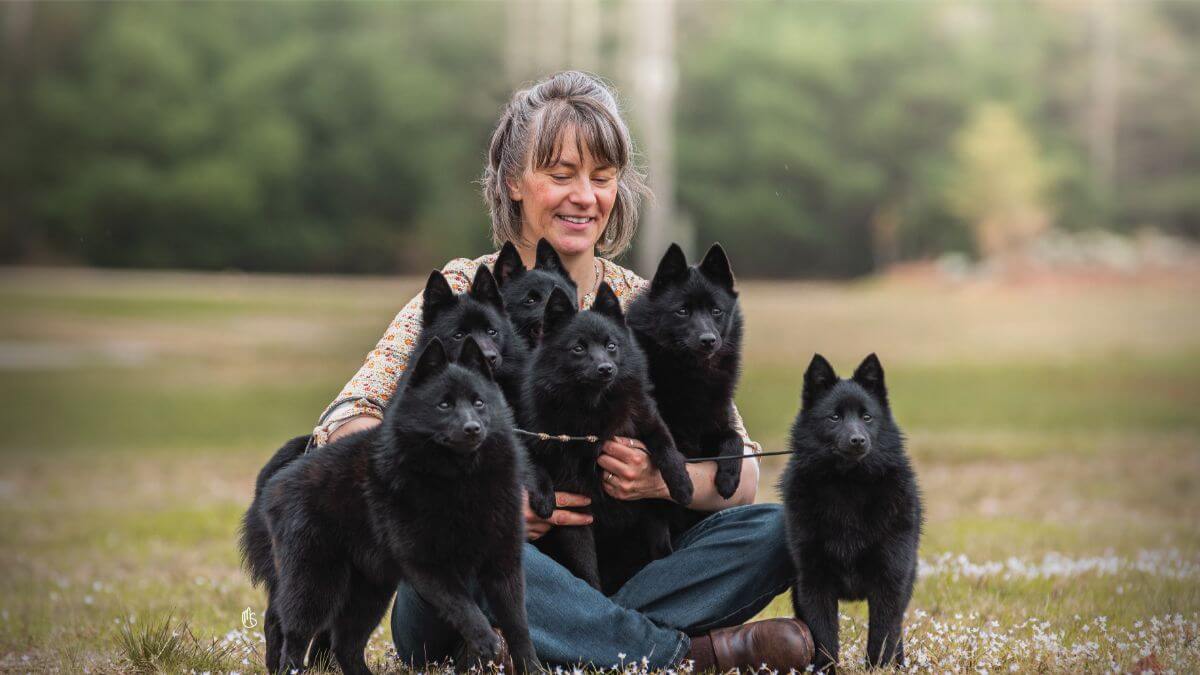
Home » Kristin Morrison | Full Moon Schipperkes, Reg’d.

Kristin Morrison: I was born into a dog show family, so dogs have always been a huge part of my life. I bred my first litter of Alaskan Malamutes with my parents when I was 12 years old. I had bred with them for many years until I started showing and breeding Schipperkes. I have been breeding Schipperkes for almost 20 years.
Kristin Morrison: My kennel name is FullMoon Schipperkes, Reg’d. I keep an average of 10-15 dogs.
Kristin Morrison: I have bred a few influential dams/sires that have produced multiple champions in the US, including multi-Group winning/placing and National Specialty wins as well as champions in several other countries. In 2023, a puppy that I bred here and sent to co-own with good friends in the UK won Best of Breed at Crufts, making history as the youngest and only full-tailed import to win Best of Breed at this prestigious show.
Kristin Morrison: My puppies are whelped and raised in our home. We have two teenage boys, so our house is usually busy with different sounds which helps the puppies get used to all that hustle and bustle of family life. Our dogs enjoy a large dog yard with stone walls and plenty of room to run and play.
Kristin Morrison: I strive to breed Schipperkes with sound temperaments and structure. This has always been important to me having grown up showing Working breeds. I tend to keep my puppies a few weeks longer than some do so that I can evaluate their structure at different critical development points.
Kristin Morrison: Regular bathing, brushing, and a good-quality food help to maintain their solid, natural black coat and specific coat pattern. Also, keeping them active prepares them for any event.
Kristin Morrison: A trend that has been a constant in recent years is straight fronts and unbalanced dogs. An unbalanced dog will not exhibit the appropriate movement for the breed if the front feet cannot get out of the way of the incoming rear feet, which will cause the front to flip. Also, trimming of the Schipperke’s coat pattern must not be done. I think if breeders continue to consider their impact on the future of the breed, then we will be in good shape
Kristin Morrison: Schipperkes can make excellent family pets for the right owners. They are very smart and quick to learn, but they are not for everyone. Even though they are small in size, they do best with regular exercise. They enjoy hiking, kayaking, and just being with their family.
Kristin Morrison: The biggest misconception is that Schipperkes have bad temperaments. I feel that the breed’s best-kept secret is that they are amazing caregivers. They have this way of knowing when you are not feeling well, or had a bad day, and will just be there for you.
Kristin Morrison: I definitely feel that the Conformation climate has changed since I was growing up in the sport. Overall, judging feels more political these days. I am on the fence about the number of shows offered. On one hand, it is great to be able to possibly show almost every weekend; however, especially in a breed where majors are not easy to come by, more shows typically means more spread out entries and less chance of majors.
Kristin Morrison: I feel that social media has helped us “meet” new people and gain new breeding opportunities, but in so many ways social media is detrimental to our lives in general. It is no different in the dog show world.
Kristin Morrison: I think that so much has changed in our world over the last several years. Life in some ways is more stressful, so it makes people just want to “get by” and not strive for improvement or excellence. I think that preservation breeders need to set aside current trends that gain them wins, and strive for betterment of the breed into the future. Being able to objectively view the dogs that we are producing is key. Although training is very important, a well-trained dog is not always the most typey or structurally sound dog in the ring.
Kristin Morrison: On both the veterinary side and breeding/showing aspects, I think that the advances in science can now afford breeders the opportunities to use stud dogs for breeding that are outside of their breeding lines and possibly outside of the country. This can help the future of breeding as a whole.
Kristin Morrison: If you have two dogs of similar and/or pleasing type in your ring, please consider the future of the breed and which attributes are more easily corrected in the next generation vs. common structural faults.
Kristin Morrison: At our National, they used have a “talent” contest where many exhibitors would dress up with their dogs and do little skits. It was always good for a great laugh!